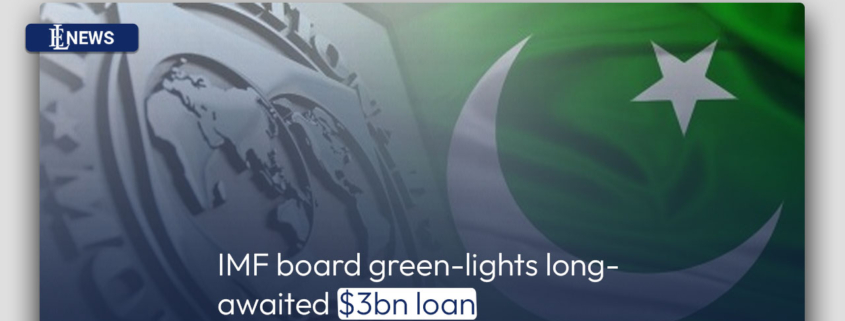IMF board green-lights long-awaited $3bn loan
Approval permits the immediate disbursement of $1.2 billion to bolster reserves. The prime minister describes the IMF’s approval as a “major step forward” that strengthens the nation’s economic position. The remaining balance will be paid in two installments.
Read more with EL news: Launch of a project to promote climate-smart practices in Baluchistan
Wednesday, the International Monetary Fund (IMF) announced that its executive board had approved a $3 billion loan agreement for Pakistan, releasing vital funding for the country’s troubled economy.
The IMF said in a statement that its executive board approved the nine-month contingency arrangement (SBA) to “support the authorities’ economic stabilization program.”
This follows the announcement last month of a staff-level agreement between the Fund and Pakistan, and the latest approval permits an immediate disbursement of approximately $1.2 billion.
IMF said in a statement that the board authorised the bailout package for the country in the amount of 2.25 billion Special Drawing Rights (SDRs) — reserve funds that the institution credits to the accounts of its member nations. This amounts to approximately $3 billion, or 111% of Pakistan’s quota, it was stated.
The IMF explained that the economic reform programme it signed with Pakistan “aims to support immediate efforts to stabilise the economy and guard against shocks, while creating space for social and development spending to benefit the Pakistani people.”
In a tweet, Prime Minister Shehbaz Sharif referred to the IMF’s approval as “a major step forward” in the government’s efforts to stabilise the economy and attain macroeconomic stability.
“It strengthens Pakistan’s economic position to overcome short- to medium-term economic challenges,” he added, giving authorities fiscal flexibility to chart the future.
This was described as “a positive development” by Masood Khan, Pakistan’s ambassador to the United States, who has been involved in the process.
He stated that the ratification of SBA had “already restored market confidence” and was “unlocking credit and external financing” from friendly nations. He stated that Pakistan would continue to proceed towards macroeconomic stability from this point forward.
The ambassador also expressed gratitude for the United States’ assistance during the approval process, stating, “We appreciate the United States’ support in the IMF.” We will continue to collaborate with the United States to strengthen our economic partnership.”
The’supportive’ State Department
During a press briefing on Tuesday afternoon in Washington, State Department Spokesperson Mathew Miller indicated that the United States supported Pakistan’s efforts to continue its IMF loan arrangement.
“During these difficult times, we stand by the Pakistani people,” I would say. We applaud the progress made by the IMF and Pakistan in reaching an agreement at the staff level,” he said.
“Our support for the economic prosperity of the nation is unwavering. And we will continue to strengthen our commercial and investment relations with Pakistan through technical engagements.”
However, the US official cautioned that “Pakistan has a lot of hard work ahead of it in order to be on a long-term, sustainable path to economic recovery and prosperity,” but promised that “we will continue to stand by them throughout this process.”
Wednesday’s IMF board meeting concluded with a statement emphasizing this point.
subject to evaluation quarterly
It was stated that Pakistan’s and the program’s success depended on the implementation of policies with consistency. “This will require greater fiscal discipline, a market-determined exchange rate to absorb external pressures, and further progress on reforms related to the energy sector, climate resilience, and business climate.”
The statement noted that the agreement “comes at a difficult time for Pakistan’s economy. A difficult external environment, devastating floods, and policy blunders led to large fiscal and external deficits, rising inflation, and diminished reserve buffers in FY23 [the fiscal year that concluded in June].
It was stated that Pakistan’s new SBA-supported program would provide a policy anchor for addressing internal and external imbalances as well as a framework for financial assistance from multilateral and bilateral partners.
The IMF stated that the program would concentrate on four key points: the implementation of the 2023-24 budget to facilitate Pakistan’s fiscal adjustment and ensure debt sustainability, while protecting essential social spending; a return to a market-determined exchange rate and proper foreign exchange market functioning to absorb external shocks and eliminate forex shortages; an appropriately tight monetary policy aimed at disinflation; and progress on structural reforms.
Excluding the $1.2bn that will be disbursed immediately, the remaining funds will be disbursed over the duration of the program, subject to two quarterly reviews.



